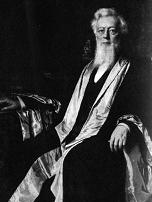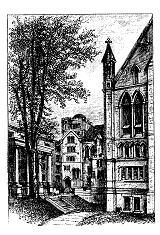Frederick Augustus Porter Barnard, Biography
parts
from Columbia Encyclopaedia, sixth edition,
and from Appleton's Cyclopaedia of American Biography
(you
can click on the images to enlarge them)
See also this other
biography
 Fredrick Augustus Porter Barnard (Sheffield 1809 - New-York 1889)
Fredrick Augustus Porter Barnard (Sheffield 1809 - New-York 1889)
President
of Oxford University Mississippi, from 1856 to 1858, and Chancellor from
1858 to 1861
President of Columbia College, New-York (now Columbia
Univ.) from 1864 to 1889
... and author of the first perfect
magic cubes of order 11 published in 1888
American educator and mathematician, born in Sheffield,
Massachusetts, 5 May 1809. His grandfather was General B. P. Porter,
afterwards Secretary of War under John Quincy Adams. He was graduated at Yale in 1828, became tutor there
in 1829, in 1831 teacher in the asylum for the deaf and dumb at Hartford, and in
1832 in that of New York. From 1837 to 1848 he was professor of mathematics and
natural philosophy in the University of Alabama, and afterward of chemistry till
1854. The same year he took orders in the Episcopal Church. He then became
professor of mathematics and astronomy in the University of Mississippi, of
which institution he was elected president in 1856. He served there as president
(1856–58) and chancellor (1858–61), but resigned at the outbreak of the Civil
War to return to the North. After a period of research in astronomy and after
work as head of the map and chart department of the U.S. Coast Survey, he was
selected to succeed Charles King as president of Columbia College, New York (now Columbia
University).
During his long administration (1864–89), Columbia grew from a small
undergraduate college of 150 students into one of the nation's great
universities, with an enrollment of 1,500. He was instrumental in expanding the
curriculum, adding departments and fostering the development of the School of
Mines (founded 1864; now included in the School of Engineering). He extended the
elective system and advocated equal educational privileges for men and women.
Barnard College, the woman's undergraduate unit of Columbia, was named for him,
even though he himself favored coeducation.

Partial
view of the old and new buildings of Columbia College
He edited Johnson's New Universal Cyclopaedia (1876–78) and
wrote many addresses, articles, books, and pamphlets in the fields of
mathematics, physics, economics, and education. His annual reports on Columbia,
outstanding discussions of the significance of current educational progress,
were edited by W. F. Russell in The Rise of a University, Vol. I
(1937). He
was United States commissioner to the universal exposition at Paris in 1867, and
published an elaborate "Report on Machinery and Industrial Arts" (New York,
1869) ; and he was also United States assistant commissioner-general to the
Paris exposition of 1878. His other principal works are:
- "Treatise on
Arithmetic" (1830);
- "Analytic Grammar with Symbolic Illustration " (1836),
originating a system still used in the principal institutions for the deaf and
dumb;
- various reports, essays, etc., on collegiate and University education,
including a volume of "Letters on Collegiate Government" (1855);
- "History of the
United States Coast Survey "(1857) ;
- "Recent Progress of Science" (1869) ;
- "The
Metric System" (1871);
- "Imaginary Metrological System of the Great Pyramid"
(1884);
- and "Theory of Magic Squares and of Magic Cubes" (1888).
In 1860 he was a member of the expedition to observe the eclipse of the
sun in Labrador ; in 1862 was engaged in reducing observations of stars in the
southern hemisphere ; and in 1863 had charge of the publication of charts and
maps of the United States coast survey. In 1860 he was elected president of the
American Association for the Advancement of Science, in 1865 of the board of
experts of the American Bureau of Mines, and in 1872 of the American Institute, he was one of the original incorporators named in the charter of the National
Academy of Sciences, and from 1874 to 1880 was foreign secretary of that body.
In 1855 he received the degree of LL.D. from Jefferson College, Mississippi, and
in 1859 from Yale; in 1861 that of died D. from the University of Mississippi ;
and in 1872 that of doctor of literature from the regents of the University of
the state of New York. He has contributed to the American Journal of Education
from its beginning, and to Silliman's Journal since 1837.
Return to the home page http://www.multimagie.com